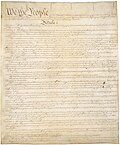Legislation
Legislation (or "statutory law") is law which has been created by a legislature or other governing body. The term may refer to a single law, or the collective body of enacted law, while "statute" is also used to refer to a single law. Before an item of legislation becomes law it may be known as a bill, which is typically also known as "legislation" while it remains under active consideration.
Under the Westminster system, an item of legislation is known as an Act of Parliament.
Legislation is usually proposed by a member of the legislature (e.g. a member of Congress or Parliament), or by the executive, then it is debated by members of the legislature and is often amended. Those who have the formal power to create legislation are known as legislators, the judicial branch of government may have the formal power to interpret legislation.
Other means of law-making
The act of making legislation is sometimes known as legislating. Under the doctrine of separation of powers, the law-making function is primarily the responsibility of the legislature. However, there are situations where legislation is enacted by other means (most commonly when constitutional law is enacted). These other forms of law-making include referenda and constitutional conventions. The term "legislation" is sometimes used to describe these situations, but other times, the term is used to distinguish acts of the legislature from these other lawmaking forms.
